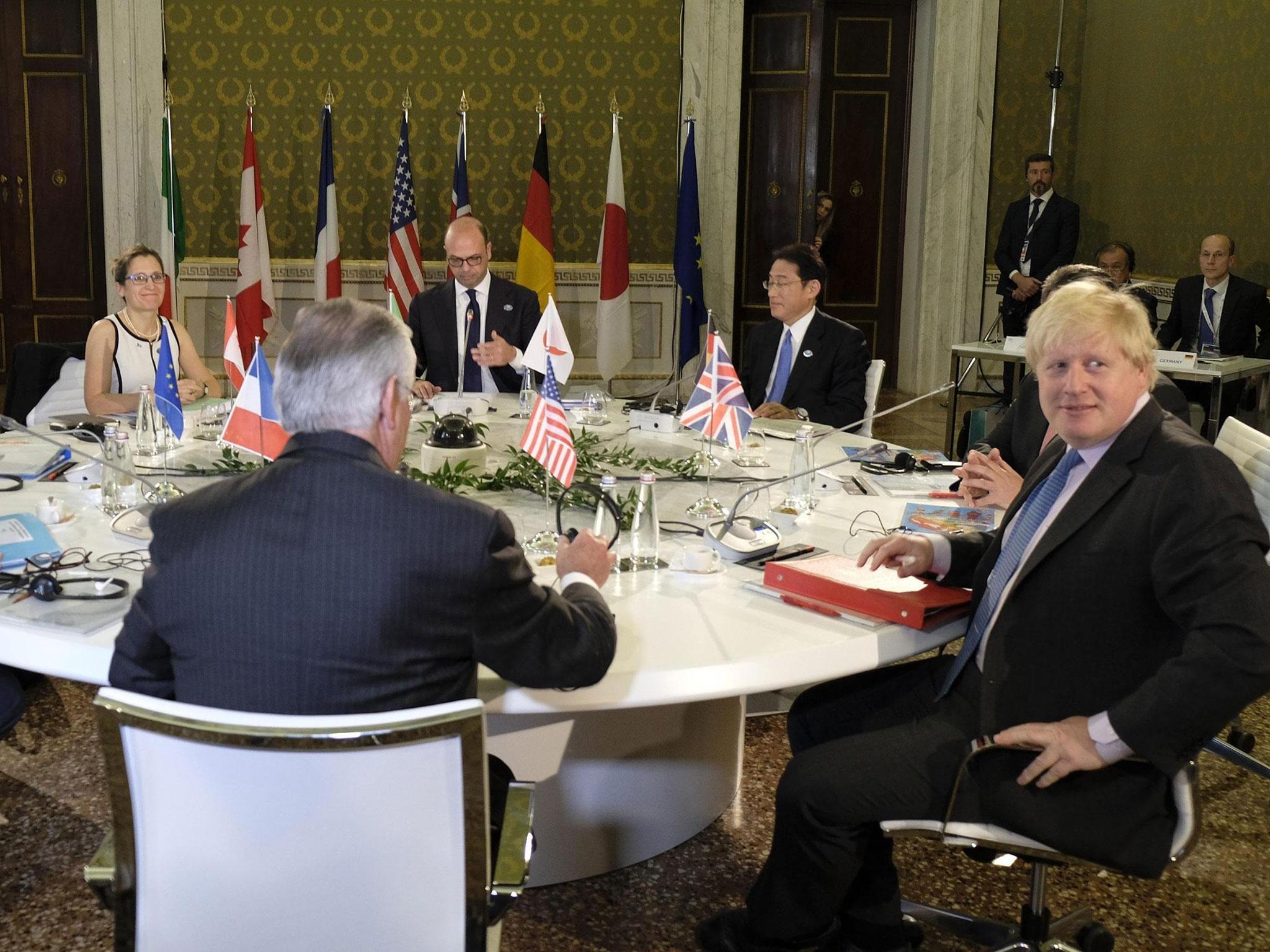China and Russia might not like it, but the G7 is now a global security force making plans for Syria
Developing countries complain that the G7 doesn't have the legitimacy of the UN to engage in such issues, and China has strongly objected in the past, most notably when maritime security in the South China Sea was discussed at the Japan summit. But the leaders soldier on

The Italy-hosted G7 meeting of foreign ministers, including Boris Johnson, concludes today.
For the fourth year running, it is only the G7 foreign ministers (Japan, United States, Canada, Germany, France, United Kingdom and Italy) rather than the G8 (which includes Russia). Russia joined the summits from 1997 to 2013, but following the annexation of Crimea, Moscow has been told it can only rejoin if “it changes course and an environment is once again created in which it is possible for the G8 to hold reasonable discussions”.
As discussion in Italy of the ongoing turmoil in Ukraine and also Syria exemplifies, the prominence of geopolitical and security issues in G7 meetings continues to be striking. In recent years, the G7 has for instance played a significant orchestration role in the West’s response to the crisis there, and the leaders will probably use the summit next month to reiterate support for the Kiev government.
What this underlines is the G7’s often underappreciated importance as an international security lynchpin. This is despite the fact that the group was originally conceived in the 1970s to monitor developments in the world economy and assess macroeconomic policies.
Outside of Ukraine, G7 foreign ministers are not just spending much time on Syria, but are also likely to echo Nato’s warnings that the security of Europe is continuing to be undermined by wider turbulence in North Africa and the Middle East. Aside from Syria, this year’s hosts, Italy, want to make a particular push to foster stability in Libya which split into a patchwork of rival fiefdoms after the collapse of the Gaddafi regime.

Migration from Libya to Italy is a pressing issue, driven by post-Gaddafi instability. A key reason for urgency is not just the number of migrants, but also the fact that the death rate on this sea route is much higher than between Greece and Turkey.
This Middle East discussion follows the debate at the Japan G7 last year when the region was also a key area of dialogue from Syria to Iran, Iraq, and Libya. Ahead of that summit, Japan pledged $6 billion in aid between 2016 and 2018 to help tackle violent extremism and bring greater stability to the region.
The G7’s involvement in this multitude of geopolitical dialogues has met with some international criticism. For instance, China strongly objected to discussion of maritime security in Asia, especially the South China Sea, at the Japan summit.
Last year, G7 foreign ministers warned of “any intimidating coercive or provocative unilateral actions that could alter the status quo and increase tensions” in both the South and East China Seas given the territorial disputes over several archipelagos there involving countries such as China, Vietnam, Malaysia and the Philippines. China, which claims much of the South China Sea, asserted in response that the G7 should focus its time instead on its founding mandate of global economic cooperation against what was in 2016 the backdrop of sub-par performance of the international economy.
It is also sometimes asserted, especially by developing countries, that the G7 lacks the legitimacy of the UN to engage in these geopolitical and security issues, and is a historical artefact given the rise of new powers, including China and India. However, it is not the case that the international security role of the G7 is new.
An early example of the lynchpin function the body has played here was in the 1970s and 1980s when it helped coordinate Western strategy towards the then Soviet Union. Moreover, following the September 2001 terrorist attacks, the G8 (including Russia) assumed a key role in the US-led “campaign against terrorism”. This began with coordinated activities helping to tackle sources of terrorism finance and, later, a “Global Partnership Against the Spread of Weapons of Mass Destruction”.
Another key security role came over Kosovo in 1999. Following unsuccessful efforts to resolve the crisis in the UN Security Council, compromise was reached between the West and Russia in the G8. Foreign ministers then drew up a resolution that was agreed at the UN.
Taken overall, the G7’s current attention on Syria underlines yet again the significant geopolitical focus of the body, despite criticism of its actions in this area. The body’s longstanding track record as a security actor underlines the fact that this role is not only likely to continue but could grow in significance, much to the opposition of some other key countries, including China.
Andrew Hammond is an Associate at LSE IDEAS at the London School of Economics
Join our commenting forum
Join thought-provoking conversations, follow other Independent readers and see their replies
Comments
Bookmark popover
Removed from bookmarks